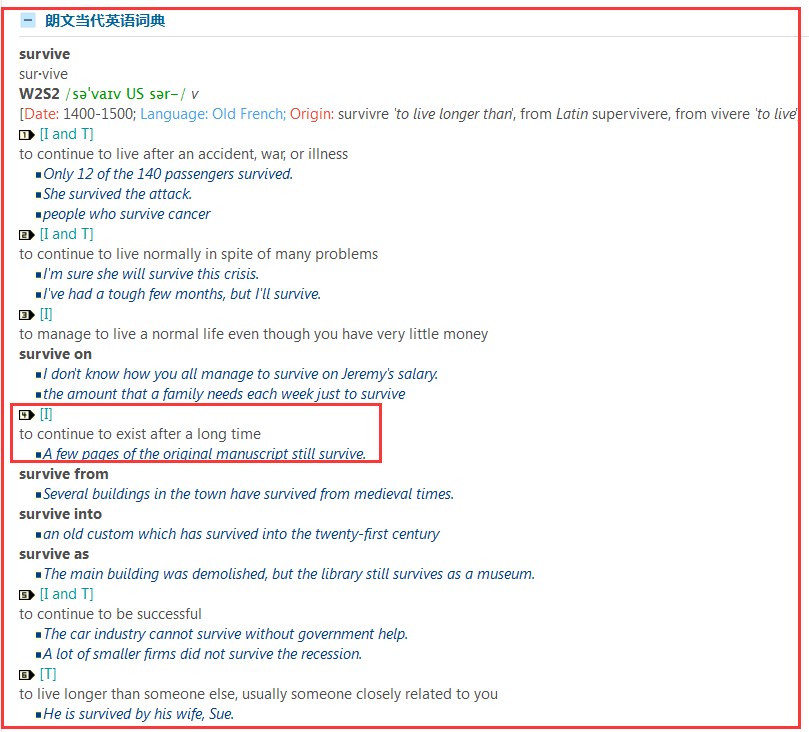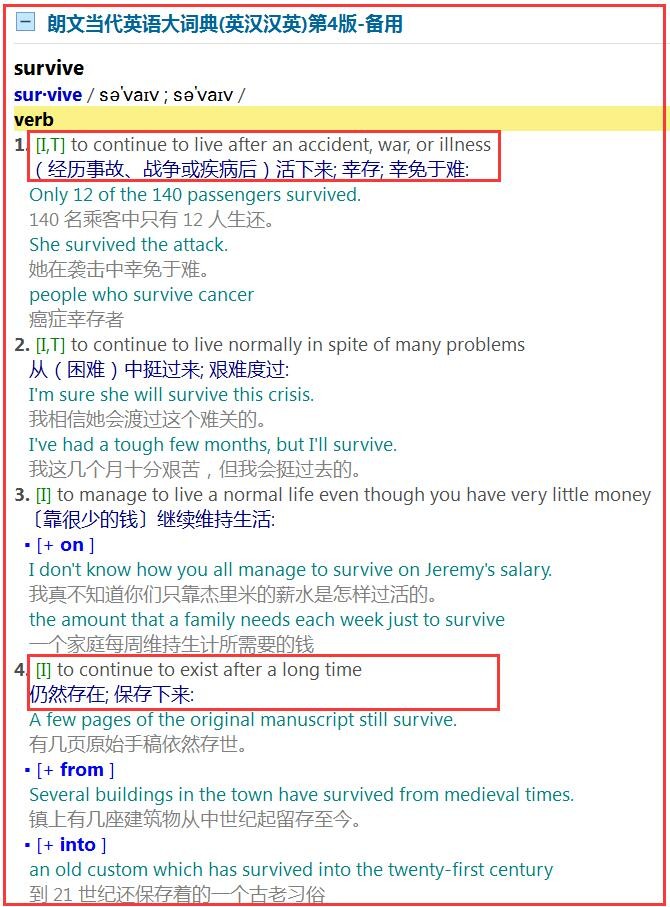3 survive的时态疑问
The Xi’an City Wall is the most complete city wall
that has survived China’s
long history. It was built originally to protect the city in the Tang dynasty
and has now been completely restored (修复). It is possible to walk or
bike the entire 14 kilometers.
上面一句摘自2021年高考的全国甲卷(全国2卷)的语法填空。请问这里的 survive 为什么用现在完成时,这个 the Xi’an City Wall 应该是古代建造的吧?
最佳答案 2023-12-14 21:54
高考句子用现在完成时是对的,虽然 the Xi’an City Wall 是古代建造的,但本句强调的是西安古城墙“幸存至今”(从过去到现在)。如:
A surprising number of his paintings have survived. 他的存世画作多得出奇。
Only fragments of the text have survived. 残存下来的只有该文本的一些片断。
Unfortunately, little of the artist’s work has survived. 不幸的是,画家的作品几乎无一幸存。
如果只是陈述“现今仍存在”这一客观事实,则也可用一般现在时。如:
A few pages of the original manuscript still survive. 有几页原始手稿依然存世。
It’s a great pity that none of his poems survive. 非常遗憾,他的诗歌没有一首保存下来。
Some of the town’s Roman monuments still survive. 小镇至今还留有一些罗马时代的文物。
The church is the only ancient building in the city to survive. 这座教堂是这个城市仅存的古建筑。
不过,我倒觉得这个句子将 survive 用作及物动词似有不妥。因为 survive 在此表示“留存至今”“保存下来”的意思(=to continue to exist after a long time),根据《朗文当代英语词典》,这样用的 survive 为不及物动词:

所以我觉得这里似乎应在 China’s long history 前面加上一个介词更合适。比较:
The Xi’an City Wall is the most complete city wall that has survived. 西安古城墙是现存最完整的城墙。
The Xi’an City Wall is the most complete city wall that has survived in China’s long history. 西安古城墙是中国悠久的历史上至今保存最完整的城墙。(in China’s long history 作为一个整体看待,指“在中国悠久的历史上”,从古至今)
The Xi’an City Wall is the most complete city wall that has survived through/throughout China’s long history. 西安古城墙是中国悠久的历史上至今保存最完整的城墙。(用介词 through / throughout 比用 in 语气更强)
这只是个人看法,欢迎其他老师发表高见!
如果觉得我的回答对您有用,请随意打赏。你的支持将鼓励我继续创作!

其它 3 个回答
认真看了前面几位老师的分析,我觉得陈老师的质疑是有道理的,好题老师的素材是有价值的,蒋老师的分析是合情理的。根据《朗文》的解析:

在上面的截图中,我们重点看看第1义和第4义:
1. [I,T] to continue to live after an accident, war, or illness(经历事故、战争或疾病后)活下来;幸存;幸免于难
……
4. [I] to continue to exist after a long time 仍然存在;保存下来
对于高考题下面这个句子:
The Xi’an City Wall is the most complete city wall that has survived China’s long history.
(1) 如果把 China’s long history 看作一段“时间”,则符合《朗文》的第4条解释(to continue to exist after a long time 仍然存在;保存下来),这样的话,survive 为不及物动词,此时后接时间应该有介词。
(2) 如果把 China’s long history 比喻成一段类似事故、战争或疾病等的“经历”则符合《朗文》的第1条解释(to continue to live after an accident, war, or illness(经历事故、战争或疾病后)活下来;幸存;幸免于难),这样的话,survive 可以用作及物动词,此时则可以直接跟宾语,不用介词。
但根据原文的语境,我觉得这里的 survive 更符合《朗文》的第4条解释,故视为不及物动词更合适,即最好像陈老师说所的,加上一个适合的介词。
附2021年高考的全国甲卷(全国2卷)语法填空完整全文:
The Xi’an City Wall is the most complete city wall that has survived China’s long history. It was built originally to protect the city in the Tang dynasty and has now been completely restored (修复). It is possible to walk or bike the entire 14 kilometers.
We accessed the wall through the South Gate. The wall is 12 meters high and from here you can see streams of people moving inside and outside the City Wall.
After spending some time looking at all the defensive equipment at the wall, we decided it was time for some action and what better than to ride on a piece of history!
We hired our bikes from the rental place at the South Gate. My bike was old and shaky but did the job. It took us about 3 hours to go all the way around the Xi’an City Wall. Supposedly you can do it in two hours, but we stopped at the different gates and watchtowers to take pictures or just to watch the local people going about their daily routines.
陈老师和好题老师的分析都有道理!综合两位老师的观点,谈谈我个人的看法,不妥之处请大家指正。
我个认觉得,网友的这个高考题句子,从语法上看加不加介词都可以,但从语境上看加上介词会更好。因为,survive 用作及物动词表示“幸存”时,其后通常接表示“危险”“灾难”之类的名词作宾语,比如 survive the fire / crash / war / earthquake / crisis / accident 等,即使接普通的名词(如 cold weather)作宾语,但通常也隐含有困难或危险之意;在美国,有些人确实是 survive US history,因为对他们来说 US history 就是一种危险、困境、灾难(尤其是在美国建国初期)。但在中国情况有所不同,尽管中国在其漫长的历史上有过曲折、动乱、被入侵等,但总的说来,说到 China’s long history,给人的感觉更多还是悠久的历史和灿烂的文明等。
当然更重要的是看 survive 在本文中的使用语境,看看本文的背景是要强调城墙所经历的危险和苦难还是强调城墙尽管经过了漫长的历史仍然保存完美这样的文化传承,从全文来看,显然是后者。
从原题全文来看,应该算是一篇游记,文章开头介绍西安古城墙,说它是中国历史上现存最完整的城墙。它最初是在唐代为护城而建,现已完全修复。整个14公里都可以步行或骑自行车。接下来的几段就说的全部是关于作者游览西安城墙的事:从南门进入城墙,看到城墙内外穿梭的人流,在城墙上骑车、拍照等。
综上,我同意陈老师说的加上介词in, through, throughout 会更好。
(1) The Xi’an City Wall is the most complete city wall that has survived China’s long history.(不加介词,意指西安古城墙是在中国漫长的历史上“幸存”下来的,强调其所经历的危险和苦难;此用法为及物用法,符合《朗文》词典的第1条用法)
(2)The Xi’an City Wall is the most complete city wall that has survived in / through / throughout China’s long history.(加上介词,意指西安古城墙经过了漫长的时间仍留存至今,并不强调其所经历的危险和苦难;此用法为不及物用法,符合《朗文》词典的第4条用法)
赞同陈老师解答。关于survive history 的用法,加不加in 都是对的,特别在美国英语中,survive表示生存下来,可以用作及物动词。《韦氏高阶字典》survive词条3有解释。另外,在美国有个电视系列节目的名字就是Surviving History. 美国人写的一本书名即:How Race Survived US History 网上也有例句如:Our technology was not good enough to survive history. 我理解survive history =live through/transcend history.个人见解,或有不妥,仅供参考。
——————————————————————————————
看了蒋老师和龙老师解答,我再补充一下我的观点。我理解survive history 这里就是指时间很长,相当于survive a long, long time,没有贬义,虽然survive 后经常接不好的事。高考文章来自介绍来中国旅游的网站,所以这里是褒义的,表示经历了这么长时间竟然保留下来了。比如这句:Our technology was not good enough to survive history. 这里显然指技术会被时间所淘汰。又例如:She survived her husband by 10 years. 这也是说她比老公多活了10年,没有贬义。如果问题句如果使用survive in history, 虽然从语法角度看也正确,但意思会略有不同,这样可以侧重指在历史上有记载的意思,不像其他的一些东西在历史上被抹去了或遗忘了。这样不一定符合语境的需要。
高考题原文出处:https://www.china-family-adventure.com/xian-wall.html
如果觉得我的回答对您有用,请随意打赏。你的支持将鼓励我继续创作!

- 4 关注
- 1 收藏,8551 浏览
- 柏晓艳 提出于 2021-06-22 19:53
相似问题
- 关于进行和完成是体aspect而非时tense的个人思考 0 回答
- 请问在这里的现在完成时为什么不用完成体 1 回答
- 辞书质疑(36): 质疑徐广联主编《当代高级英语语法》中的一句时态 2 回答
- 时态的一致性问题 1 回答
- 一般现在时和一般将来时的选择 1 回答
- By the end of last month可以搭配哪些时态 1 回答
-
 《高考英语备考1号·速效编》
《高考英语备考1号·速效编》
-
 《高考英语备考1号·写作编》
《高考英语备考1号·写作编》
-
 《高中英语晨读晚记》
《高中英语晨读晚记》
-
 《高中英语错题笔记》
《高中英语错题笔记》
-
 《零起点考大学英语》
《零起点考大学英语》
-
